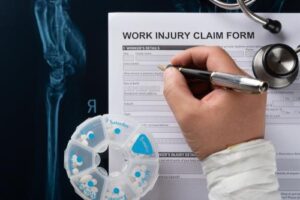
Although workers’ compensation is available to most employees, some workers and jobs are not covered. Individual state laws determine eligibility and exceptions for receiving workers’ compensation.
While these rules vary slightly, they maintain a similar standard across different states. This means some workers may find themselves without this form of protection due to specific exclusions dictated by their state’s legislation. This article will help you understand the nuances of workers’ comp law.
What to Know About Those Not Covered By Workers’ Compensation
Although traditional workers’ compensation insurance does not cover the groups mentioned here, they typically have access to other insurance or legal options if a work injury occurs. In some situations, certain workers may get coverage if their employer gives notice to the state. Either way, it’s good to know the options.
Here are the jobs and positions not typically covered by workers’ compensation (as outlined in Georgia Code § 34-9-2).
Railroad Employees
Instead of workers’ compensation, railroad employees are covered by the Federal Employers’ Liability Act. Also known as the Railroad Workers Act, this law was enacted in 1903 to protect railroad workers who get hurt.
Through this law, injured railroad workers can sue their employer if they can demonstrate the railroad was at least partially negligent in the accident that caused their injury. They can seek benefits like medical, lost wages, and sometimes pain and suffering compensation.
Farm Laborers
A farm laborer is anyone employed by a business connected to the raising, feeding, and caring of wildlife. Farm laborers are typically exempt from workers’ compensation coverage.
However, in Georgia, a farm laborer’s employer can elect to provide workers’ comp coverage if they provide notice to the state.
Federal Employees
A federal employee is employed within one of the three United States government branches. This includes employees, civil officers, and those rendering services similar to government employees or civil officers.
Although federal employees are not eligible for workers’ comp benefits, they are covered by the Federal Employee’s Compensation Act (FECA). Benefits through FECA after a work injury or illness include:
- Medical benefits.
- Total and partial disability benefits.
- Vocational rehabilitation.
- Death benefits.
Longshoremen
A longshoreman is a worker who loads, unloads, or builds ships in a port. The Longshore and Harbor Workers’ Compensation Act provides compensation and benefits for injured longshoremen.
This legislation ensures that longshoremen injured on the job are entitled to specific compensation and benefits. These benefits extend to medical care, ensuring injured workers can access necessary treatments and procedures. In addition, the act provides income compensation, helping to mitigate the financial impact of being unable to work.
Furthermore, vocational rehabilitation is available under this act, offering assistance for longshoremen to regain their working capabilities or retrain in a new profession if necessary.
Independent Contractors
Workers ‘ compensation coverage generally excludes independent contractors, consultants, and freelancers. These workers are classified as exempt through a 1099 form and pay their income tax. This typically means they cannot receive workers’ compensation.
However, there may be situations under Georgia law where these types of workers may still be classified as employees entitled to workers’ compensation. If you are an independent contractor unsure of your qualifications, contact the person you provide services for or a Georgia workers’ compensation lawyer.
Sole proprietors can also elect to be covered by workers’ comp as an employee if they advise their insurance company in writing.
Some Business Owners
Businesses in Georgia must provide workers’ compensation if they have three or more regular employees. This might exempt very small businesses from coverage. However, if the business is incorporated, the employer and all officers count as employees.
While officers can elect to be exempt from coverage, they still count towards the requirement for carrying workers’ compensation insurance.
Volunteers
Since volunteers provide services or unpaid work, they are typically not categorized as employees eligible for workers’ compensation. There are some exceptions, though.
Volunteer law enforcement personnel, firefighters, emergency response personnel, and fire responders are covered even though they fall under a volunteer status.
Get the strong arm
Speaking to a Workers’ Compensation Lawyer About Coverage
An injured worker would normally hire a workers’ compensation lawyer for help after a work injury. For the above situations, the injured worker may need to work with a lawyer specializing in these industry accidents.
Other times, an employee might not know whether or not workers’ compensation covers them and can contact a Georgia workers’ compensation lawyer for help. Some employers are not straightforward about coverage with their employers (or might not carry the coverage they are supposed to have).
When Are Injuries Not Covered By Workers’ Compensation?
Even when workers’ compensation covers an employee, there are certain situations where they may not receive benefits when an injury happens. After a work injury, you should:
- Report the injury to a supervisor immediately and no later than 30 days after the accident.
- Complete and file Form WC-14 with the SBWC.
- Send a copy of the form to your employer and the insurance company.
- See an authorized doctor immediately, and follow their treatment instructions.
You can lose your right to workers’ compensation benefits if you do not do these things.
Other reasons workers’ compensation claims are denied include:
- Disagreements about whether or not the injury was work-related.
- Injuries that happened while illegal activity was being performed.
- Filing a claim for a condition that isn’t covered.
You can request a hearing before the SBWC if you are denied any benefits. An administrative law judge (ALJ) will listen to both sides of the claim and determine whether you should receive any benefits and, if so, what they should be.
It’s best to work with an experienced workers’ compensation lawyer who can represent you during this hearing (and the rest of your case).
Statute of Limitations for Workers’ Compensation Claims in Georgia
The statute of limitations plays a significant role in workers’ compensation claims in Georgia. The time of injury is particularly crucial when it comes to these timelines. In Georgia, an injured worker typically has one year from the date of the work-related accident to file a claim for workers’ compensation.
This period applies to most types of injuries sustained in the workplace. However, exceptions can apply depending on the specific circumstances of the job accident. In cases where an employee has received immediate medical treatment following an accident, the statute of limitations could extend to one year from the date of the last provided treatment.
It’s crucial to note that this doesn’t necessarily mean a full year after the complete treatment cycle but rather a year from the last received treatment date.
How a Workers’ Compensation Lawyer Helps With the Statute of Limitations
Handling a workers’ compensation claim can be complex, given the stringent timelines and the legal nuances involved. Therefore, many individuals seek the assistance of injury lawyers specializing in workers’ compensation.
These professionals can:
- Guide you through the intricacies of the process.
- Ensure you don’t miss critical deadlines.
- Maximize the compensation you may be entitled to following a work-related accident.
Remember, each case is unique, and the types of injuries sustained can impact how the statute of limitations applies. It’s always recommended to consult with experienced injury lawyers to discuss your specific situation.
Understanding the nuances of Georgia’s statute of limitations for workers’ compensation can significantly affect your claim’s outcome.
Why You Need a Workers’ Compensation Lawyer
Navigating workers’ compensation laws can be challenging, especially when dealing with work-related injuries. Medical bills can pile up quickly, and understanding the ins and outs of a compensation policy is crucial for any employee or employer.
Understanding Your Compensation Insurance
As it stands, various insurance carriers provide different levels of coverage for workers’ compensation benefits. Every worker needs to understand what their compensation insurance entails.
The Role of a Compensation Attorney
Often, employees may require the help of a compensation attorney to ensure they receive the benefits they’re entitled to. This is particularly relevant for domestic employees who are often overlooked in the scope of employment for workers’ compensation insurance.
The Impact of Workplace Injuries
Workplace injuries can be debilitating, and without the support of a licensed insurance company providing the right workers’ compensation coverage, employees may struggle to afford their health care.
Understanding Your Profession’s Intersection with Compensation Laws
Whether you’re a railroad worker, farm laborer, or federal employee, understanding how your profession intersects with workers’ compensation laws is essential to safeguard your rights and interests.
All injured employees — whether regular employees or casual employees — should benefit from the compensation systems we have in place.
Talk to a Workers’ Compensation Lawyer in Georgia for Free Today
It’s normal to have many questions about workers’ compensation coverage. Although your employer should clarify that benefits are available, they may fail in this duty. If you need help with your claim, contact John Foy & Associates today.
With more than 20 years of experience, we know what it takes to win cases. We’ll give you a FREE consultation to review your claim details and discuss your options. To get started with your consultation, call or contact us online.
(404) 400-4000 or complete a Free Case Evaluation form





